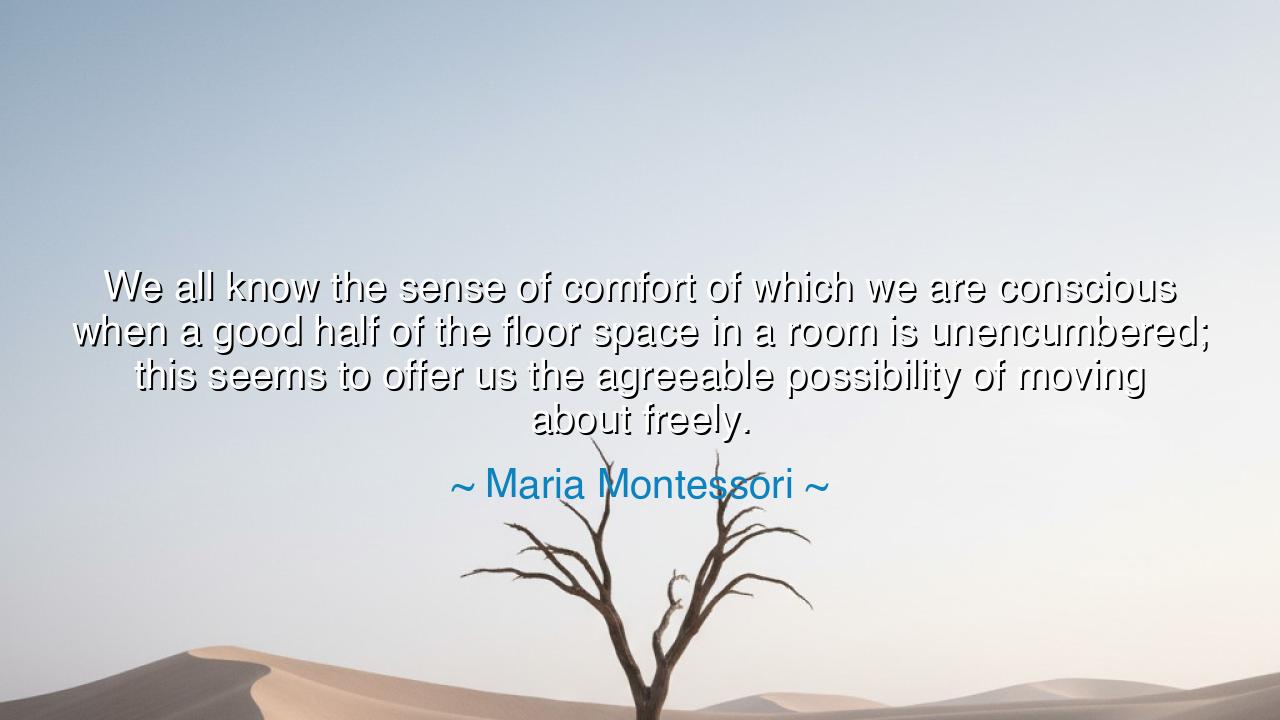
We all know the sense of comfort of which we are conscious when a
We all know the sense of comfort of which we are conscious when a good half of the floor space in a room is unencumbered; this seems to offer us the agreeable possibility of moving about freely.






Hear the words of Maria Montessori, wise teacher of children and architect of learning, who declared: “We all know the sense of comfort of which we are conscious when a good half of the floor space in a room is unencumbered; this seems to offer us the agreeable possibility of moving about freely.” Though her words speak of a room, they point to something greater: the truth that freedom, simplicity, and space are not luxuries, but necessities for the growth of both body and spirit. For where there is clutter, the mind feels trapped; where there is openness, the soul expands and breathes.
For what is space, if not the silent teacher of freedom? A child in a crowded room feels constrained, as if pressed in by invisible walls. But when the room opens, when half the floor lies bare, the child feels possibility stirring—movement, curiosity, exploration. Montessori knew this well, for she devoted her life to shaping classrooms where children could grow as naturally as flowers in an open field. The comfort of unencumbered space is not only physical—it is the comfort of the spirit, the reassurance that one is free to move, to choose, to discover.
History confirms this wisdom. Consider the monasteries of old, where monks built cloisters with open courtyards at their center. Why? Because they knew the soul needs emptiness as much as activity, stillness as much as study. Those uncluttered spaces invited meditation, reflection, and freedom of thought. So too did Montessori’s classrooms, with their simple furniture, wide floors, and open areas that called children not to sit in rigid rows, but to explore freely and learn by doing. Space itself became a guide, teaching independence without words.
Think also of the life of Leonardo da Vinci, who filled his notebooks with inventions and observations. His genius was not born in narrow spaces filled with distractions, but in open workshops where he could sketch, build, and wander in thought. His greatness teaches us that openness—whether of space, of mind, or of life—nurtures creativity. When half the floor is free, when half the schedule is unbound, when half the mind is uncluttered, then possibility emerges.
Montessori’s words also speak to the modern soul. Our lives are filled with noise, our rooms with possessions, our calendars with tasks. And yet, we wonder why we feel restless, why we hunger for peace. She reminds us: it is the freedom of movement, the open space, that brings comfort. We do not need to fill every corner of our homes or every moment of our days. It is in leaving room—empty, unclaimed, open—that we create space for life to breathe and for joy to enter.
The lesson, O seeker, is this: cherish the gift of simplicity. Keep not only your rooms but also your life unencumbered. Leave space in your home for freedom of movement; leave space in your days for reflection; leave space in your heart for others to enter. Do not mistake clutter for abundance. Abundance is not in the number of things that crowd your life, but in the freedom to move, to think, to grow.
In your own life, practice this teaching. Clear your room, and feel the peace of open space. Clear your schedule, and feel the relief of unhurried hours. Clear your mind, and feel the strength of clarity. For in emptiness lies possibility, and in simplicity lies freedom.
So let Montessori’s words stand as guidance for all generations: the comfort of space is the comfort of freedom. Honor it, create it, and guard it well, for only when we live unencumbered do we discover the full measure of our potential.






AAdministratorAdministrator
Welcome, honored guests. Please leave a comment, we will respond soon